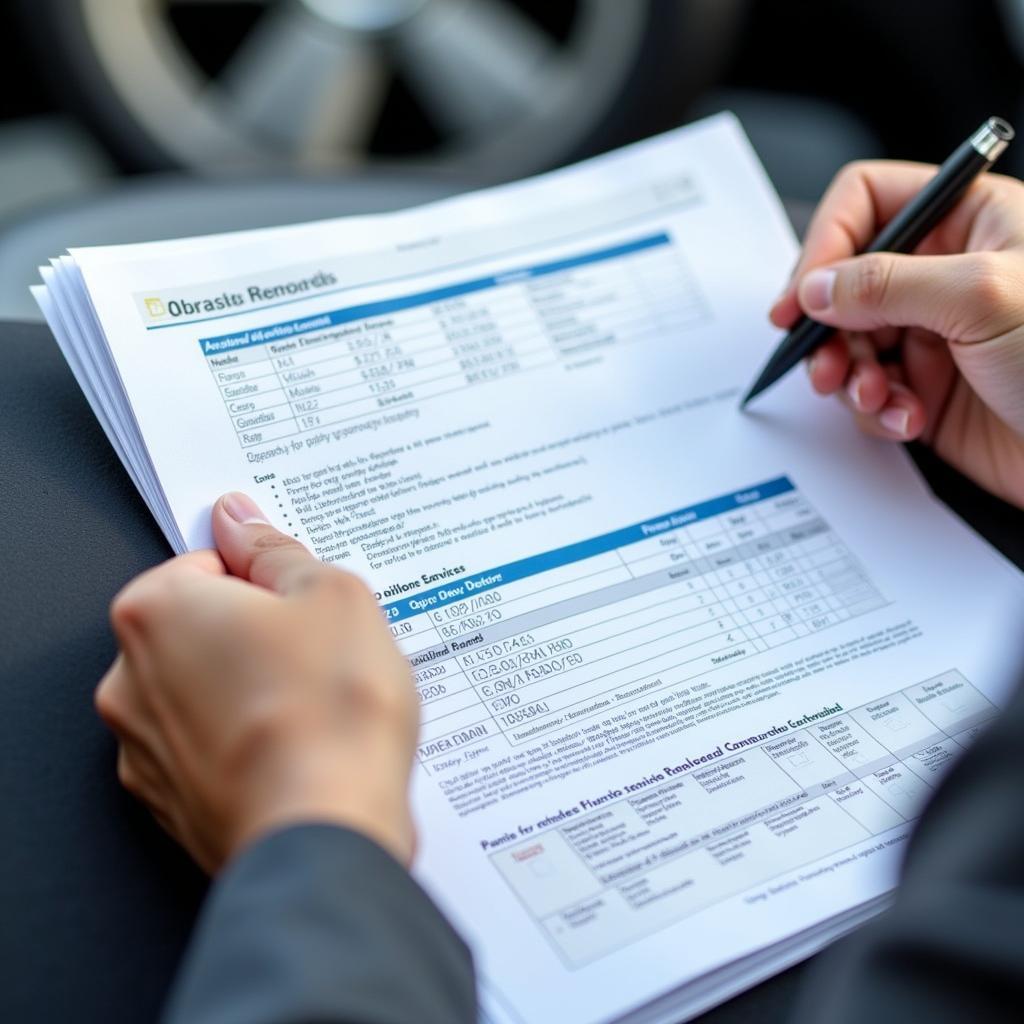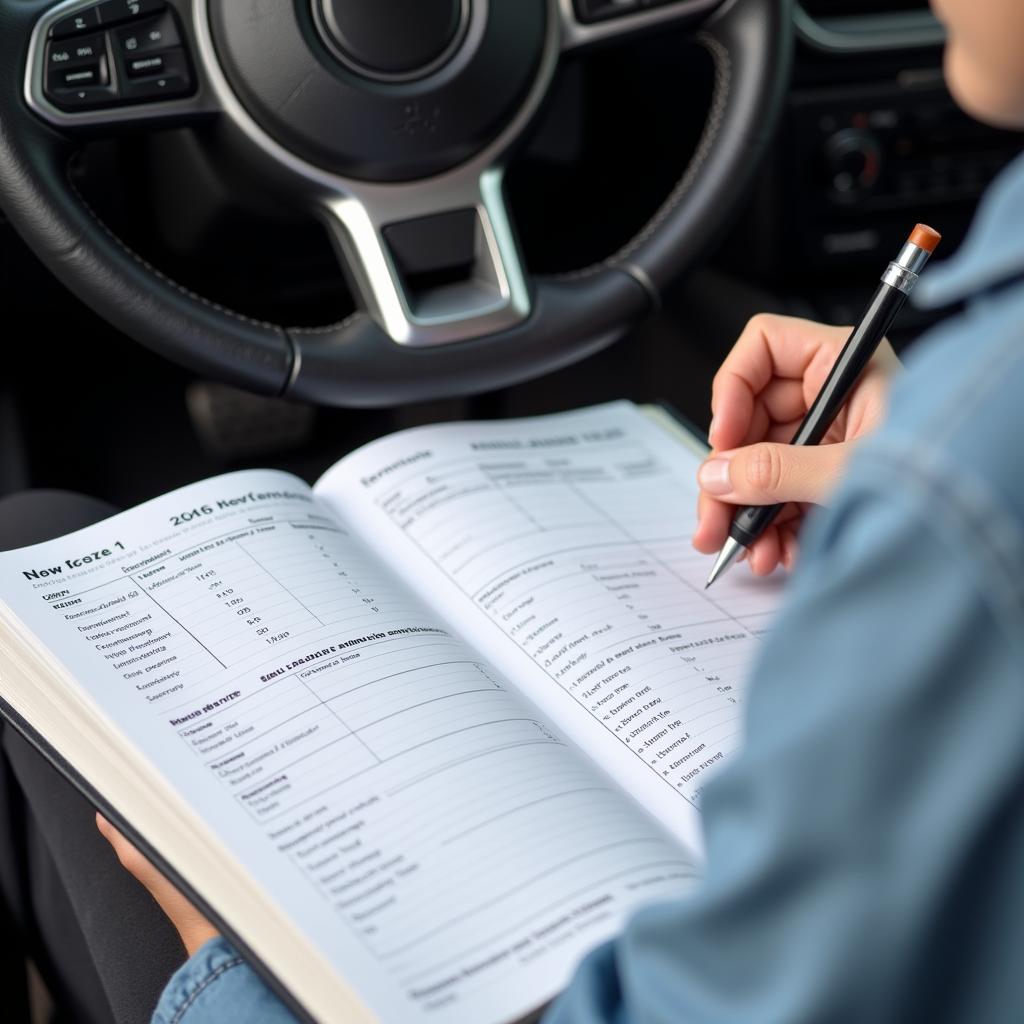You’ve just bought a new car with maintenance records – congratulations! This is a fantastic starting point. Having a documented history of your vehicle’s care means you’re already ahead of the game when it comes to maintaining its value and performance. But having those records in hand is just the beginning. Knowing what to do with them and how to continue building on that history is crucial. This article will guide you through understanding, utilizing, and continuing your car’s maintenance journey.
Decoding Your Car’s Maintenance History
Understanding your car’s maintenance history is like having a roadmap to its future. These records offer valuable insights into its past, revealing what’s been done, when, and where. This knowledge allows you to stay proactive, anticipate potential issues, and ensure your car receives the right care at the right time. What exactly should you look for in these records?
- Service Dates and Mileage: Note the frequency and consistency of services. Regular maintenance intervals suggest responsible ownership.
- Parts Replaced: Knowing which parts have been replaced helps you understand the wear and tear on your car. This is particularly crucial for components like timing belts, brakes, and tires.
- Types of Services Performed: From oil changes to major repairs, understanding the types of services performed paints a picture of your car’s overall health.
- Service Provider Information: Knowing where previous services were performed can be helpful if you need to follow up on specific issues or seek consistent care from a trusted mechanic.
 Reviewing New Car Maintenance Records
Reviewing New Car Maintenance Records
Now that you understand the content of the records, let’s move on to how to best utilize this treasure trove of information.
Utilizing Your Maintenance Records for Proactive Car Care
Having maintenance records isn’t just about knowing the past; it’s about planning for the future. They are a powerful tool for proactive car care, enabling you to anticipate and address potential problems before they become major headaches. Here’s how to use them to your advantage:
- Establish a Baseline: Your car’s maintenance history sets a baseline for its future care. Use this information to create a personalized maintenance schedule, ensuring you continue with regular servicing and address any recurring issues.
- Identify Potential Problems: If you see a pattern of recurring repairs, you can address the underlying cause proactively. For example, frequent brake repairs might indicate a larger issue with the braking system.
- Plan for Future Maintenance: Knowing when certain components were last serviced helps you anticipate upcoming maintenance needs, such as timing belt replacements or transmission fluid flushes. This allows you to budget and schedule these services accordingly.
required maintenance for a leased car
“Maintaining a vehicle is an ongoing process, not a one-time event,” says automotive expert John Smith, ASE Certified Master Technician. “Consistent maintenance, informed by accurate records, is the key to a long and healthy car life.”
Continuing the Legacy of Good Maintenance
Your new car’s existing maintenance records are a great starting point, but your journey doesn’t end there. It’s your responsibility to continue the legacy of good maintenance and build upon the existing foundation.
- Keep Meticulous Records: Every time you service your car, keep detailed records of the work performed, parts replaced, and the date and mileage. This creates a continuous, comprehensive history for your vehicle.
- Find a Trusted Mechanic: A reliable mechanic is your partner in car care. Choose a reputable shop and develop a relationship with them. This ensures consistent quality service and allows your mechanic to understand your car’s specific needs over time.
- Follow Recommended Service Intervals: Consult your car’s owner’s manual for recommended service intervals. Adhering to these guidelines is crucial for preventing premature wear and tear and maintaining your car’s value.
 Maintaining a Car Maintenance Log Book
Maintaining a Car Maintenance Log Book
“Think of your car’s maintenance log as its medical history,” advises automotive expert Sarah Johnson, lead mechanic at Johnson Automotive. “The more detailed the information, the better equipped you and your mechanic are to diagnose and address any issues.”
another word for car maintenance
Bought New Car With Maintenance Records: What to do Next?
So, you’ve bought a new car with maintenance records—what’s the next step? Use this information to understand your vehicle’s maintenance history, plan future services, and choose a reliable mechanic to continue its care. By taking a proactive approach to maintenance, you’ll not only extend the life of your vehicle but also protect your investment.
We understand that car maintenance can seem daunting. If you have any questions or need assistance, don’t hesitate to contact us at AutoTipPro. Our team of experts is here to help!
Contact us:
Phone: +1 (641) 206-8880
Office: 500 N St Mary’s St, San Antonio, TX 78205, United States
 Contacting Autotippro for Car Maintenance Help
Contacting Autotippro for Car Maintenance Help
FAQ
- What if my new car’s maintenance records are incomplete? Don’t worry! Even partial records are helpful. Start keeping detailed records from the day you purchase the car to build a comprehensive history moving forward.
- How often should I service my new car? Refer to your owner’s manual for specific recommendations. General guidelines often suggest oil changes every 5,000-7,500 miles and tire rotations every 5,000-8,000 miles.
- Is it necessary to keep my own maintenance records if the service provider keeps them? Absolutely! Having your own records ensures you have easy access to this important information.
- What should I do if I lose my car’s maintenance records? Contact the previous owner or the service providers listed in the records. They may be able to provide copies.
- Are digital maintenance records acceptable? Yes! Digital records are a convenient and efficient way to track your car’s maintenance history.
- How can I determine if the maintenance records are genuine? Look for consistent formatting, official logos, and contact information for the service providers. If in doubt, contact the service providers to verify the records.
- Why are maintenance records important when selling a car? Maintenance records demonstrate responsible ownership and can increase your car’s resale value. They provide potential buyers with confidence in the vehicle’s condition and history.





Leave a Reply